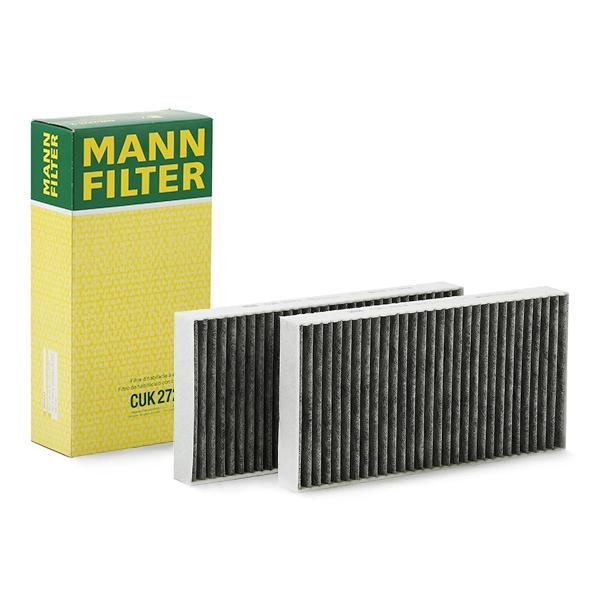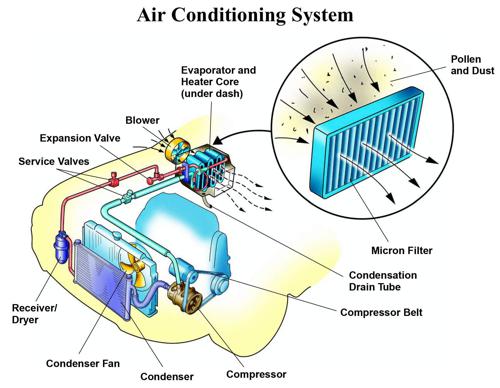A bad smell coming from your AC is not good. It usually means there’s a problem with the air conditioning system. Let’s see what it could be and how you can fix it.
The last thing you want on a hot day is a foul smell coming from the AC. Unfortunately, this is a commong problem – nasty smells from the air conditioner system (AC) are frequent and sitting in a car with a stinky AC can downright ruin the whole driving and cruising experience.
Types of car AC smells & odors
Let’s drill down on each smell type, and see what can we do about making it go away.
Stale or even sour AC air in your car
Think of an old gym bag. An old pair of sneakers from that box in the back of the attic.
Most of the time, this is because you have a dirty cabin filter that you need to replace. This is an easy DIY job, we’re talking a couple of minutes here. So make yourself a favour and look up in the service manual or owner’s manual for your car’s make and model. Or just Google it.
note: for my car, a Renault Laguna III, there are some filters (about 20% more expensive) that have ‘active charchoal’. And they hold up a lot better and they do a better job – I swear it’s not placebo. Check your local or online parts store, maybe your car can have one too.
Moldy or musty AC air
A moldy smell usually indicates dirt, dust and debris buildup in the under-hood air intake vent. This traps water and moisture on the AC evaporator and in the evaporator case. With this debris and dirt, all kind of gunk and germs can grow. Even mold.
You can clean this yourself by flushing the AC evaporator case through the car’s air intake with a disinfectant and then clean the ducts with an anti-bacterial spray. But I’d go to a shop that uses professional grade chemicals to get rid of this kind of gunk and mold just to be safe. Your call.
The AC evaporator case has a drain hole. If you don’t see clear water dripping from under your car when the AC is running (around the middle of the car), this drain hole might be clogged. Check your owner’s manual to find the exact drain location.
And then clear it using a wire coat hander. Just try and get as much of the gunk out as possible.
But, on some cars, this drain hole is under the car. You should ask a mechanic to clean it out if you are not feeling up to tackling this.
Do note that a clogged AC drain can cause water to leak into the passenger compartment. Wet carpets and then mold are the usual steps. So don’t neglect it.
Chemical odor coming from car AC
A chemical odor (sometimes moldy too, not just chemical), most of the times tells us that the AC evaporator is leaking refrigerant.
Another possible sign is if you can hear the blower fan running but there is almost no air coming from the vents. Oil has trapped dust and dirt on the evaporator, and that restricts air flow.
Usually, this is a task best left to mechanics.
Sweet pungent odor from your car’s AC
A sweet – maple syrupy smell might sound nice. But this usually indicates that your heater core is leaking and seeping engine coolant into the AC ducts. You’ll most likely need to replace the heater core. Unfortunately, it is not an easy task.
This is not a healthy smell to take in. Fix it and try not to take in too much sweet fumes.
Burning smell
This is harder to troubleshoot, as in it requires a deeper look at a number of things, not just your AC system.
Based on the type of burning smell, you might get some hints on what to check
- burning oil smell: if your engine is leaking some oil from a gasket, hose or even the oil filter… it might emit a burning oil odor and it is picked up by your AC and brought to you inside;
- burning rubber: this might tell you that there is an issue with the AC compressor, AC compressor clutch, or a misaligned pulley. These things cuase the belt to drag, and that gives us the burning rubber smell;
- burning plastic: electrical shorts, burning wires and even excessive dust (depending on environment) can give out that burning plastic smell;
Needless to say, in case of a burning smell I’d stop ASAP and check the car. You want to make sure there is nothing extremely wrong. Sure, you can drive a couple of miles to the mechanic without AC. But if you have a dangerous electrical short, a big oil leak or something like this you don’t need to risk an accident. Be cautios, safety comes first!
Gasoline smell from the AC
Your cabin filter is not strong enought to filter strong smells like gas.
So if you notice a persistent gasoline smell, and you’re sure it’s not fumes from the car in front or something like that, shut the car down and check it’s fuel system! Or take it to a mechanic to perform an inspection.
How your car’s AC works
And in case you were wondering, this is how your car’s AC work:
The whole AC system cools the air inside your vehicle through a four phase cycle.
Refrigerant flows through sever parts and changes from low to high pressure, and from a liquid state to a gas state. As a low-pressure gas, the refrigerant absorbs the heat from the passenger compartiment, expelling it. This leaves the passenger compartiment receiving cold air.
The moisture your AC system is removing is the water you usually see dripping under your car – this is a normal phenomenon and it is a sign that the AC system of your car is operating normally.
Conclusions
If you go the DIY route, and want to clean stuff yourself, please don’t use any caustic drain cleaners. You’ll damage stuff in your AC system.
A good tip is to avoid running your AC only in recirculate mode. This recirculation mode prevents fresh air from the outside from entering the AC ducts. The problem is that excess moisture can build up, and only fresh air cand help dry it out efficiently. So by not using the recirculation mode excessively, you can prevent mold.
It is a good practice to include checking the AC system and the cabin filter as part of your basic DIY maintenance plan. You can prevent big issues and nasty stuff coming up at the worst time. For reference, I’d change the cabin filter every 6 to 12 months, depending on how dirty your environment is. I’d check it, and if after 6 months it looks pretty new, you can probably leave it one year.
I hope you found this article useful!






Comments are closed.